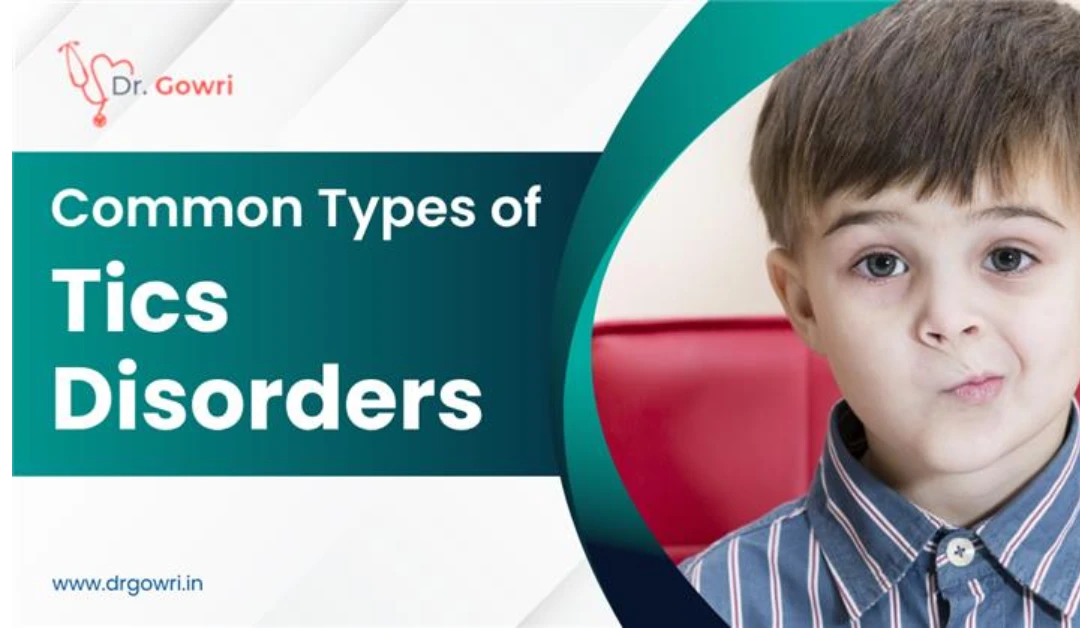What Are Tics?
Tics are sudden, repetitive movements or sounds that a person makes involuntarily. They’re not done on purpose.
There are two main types:
- Motor tics – These involve movements like eye blinking, head jerking, shoulder shrugging, or facial grimacing.
- Vocal tics – These are sounds like throat clearing, sniffing, grunting, or repeating words or phrases.
Tics can be simple, i.e., quick, brief movements or sounds, or complex, i.e., a series of movements or actions.
Common Types of Tic Disorders
- Provisional Tic Disorder: When tics have been present for less than a year. This is quite common in young children and often resolves on its own.
- Persistent Tic Disorder: When motor or vocal tics (but not both) have been present for over a year.
- Tourette Syndrome: A condition where both motor and vocal tics are present for more than a year.
What Causes Tics?
Tics aren’t anyone’s fault, not yours and certainly not your child’s. They can be influenced by:
- Genetics: Tics mostly can run in families. Especially when a first degree relative has the condition.
- Brain chemistry: Differences in certain brain chemicals, like dopamine, may end up into the condition.
- Stress or excitement: These can make tics more noticeable, but they don’t cause them.
Tics often come and go. They might disappear for weeks or months and then return. This pattern is completely normal.
Should I Be Worried?
In many cases, tics are mild and don’t require treatment. Most children grow out of them or learn to manage them over time. However, if tics are causing distress, interfering with school or daily life, or lasting more than a year, it’s a good idea to talk to a pediatrician or child psychologist.
Sometimes, tics occur alongside other conditions, like ADHD, anxiety, or OCD. A full evaluation can help make sure your child gets the right support.
How Can I Help My Child?
Beyond formal treatment, the support and understanding your child receives in their environment can make a significant difference in their ability to cope with tics. Here are some ways to support your child:
- Educate yourself and others (family, friends, teachers) about tic disorders.
- Create a Supportive Home Environment at home.
- Focus on your child’s strengths and accomplishments. Avoid criticizing or punishing them for their tics.
- Create a safe and open space for your child to talk about their tics and feelings. Let them know that you are there to support them, no matter what.
- Unless your child brings it up, as it can increase their self-consciousness and anxiety, which can worsen tic symptoms.
- Identify and minimize potential triggers for tics, such as stress, fatigue, and certain foods or activities.
- Encourage your child to engage in physical activity, as exercise can help reduce stress and anxiety and improve overall well-being.
Navigating School and Social Situations
School and social situations can be particularly challenging for children with tic disorders. Here are some tips to overcome these situations:
- Talk to the school about your child’s tic disorder and needed support.
- Teach your child how to deal with bullying, as there is a high chance that a child with the condition can be bullied, and inform the school.
- Encourage participation in activities to build social skills and confidence.
- Educate classmates to promote understanding of child’s condition.
- Practice social situations through role-playing at home.
Final Thoughts
Tic disorders can be frustrating at times, but they are nothing to be ashamed of. With patience, support, and a bit of knowledge, you can help your child navigate this journey with confidence.
About the Author

Dr. Gowri Ravi Chinthalapalli is a Developmental and Family Physician with over 16 years of experience in child development and family medicine. She has treated more than 50,000 patients worldwide. After completing her MBBS from Rajiv Gandhi University of Health Sciences, she pursued MRCGP from the UK and gained wide experience in primary care and emergency medicine. She also holds a Fellowship in Child Development from the Centre for Child Development and Disabilities, Bengaluru. Dr. Gowri currently practices at Aster CMI Hospital and Canara Diagnostic Centre, Bengaluru. She is passionate about guiding families, supporting children with developmental needs, and providing holistic care.

